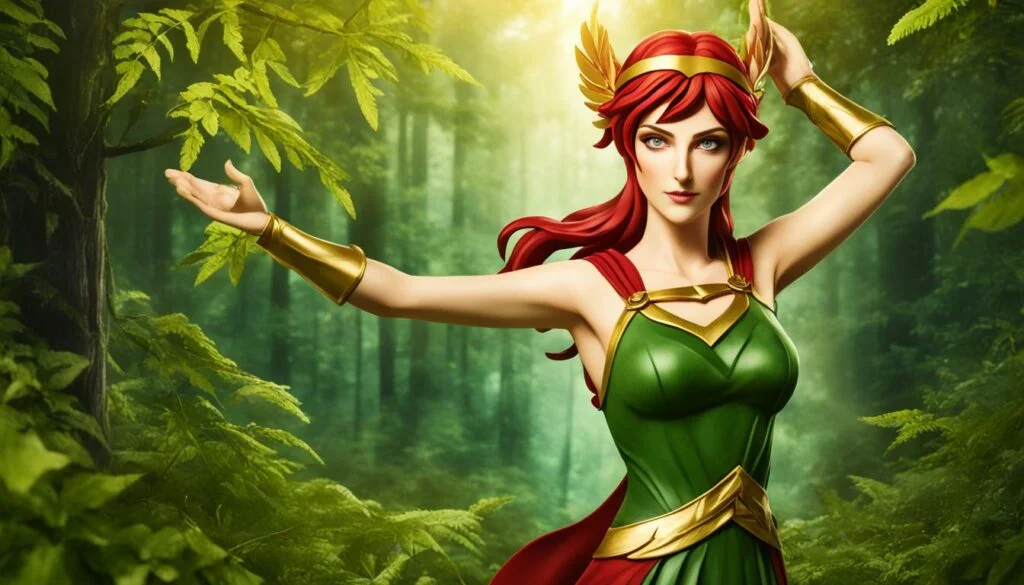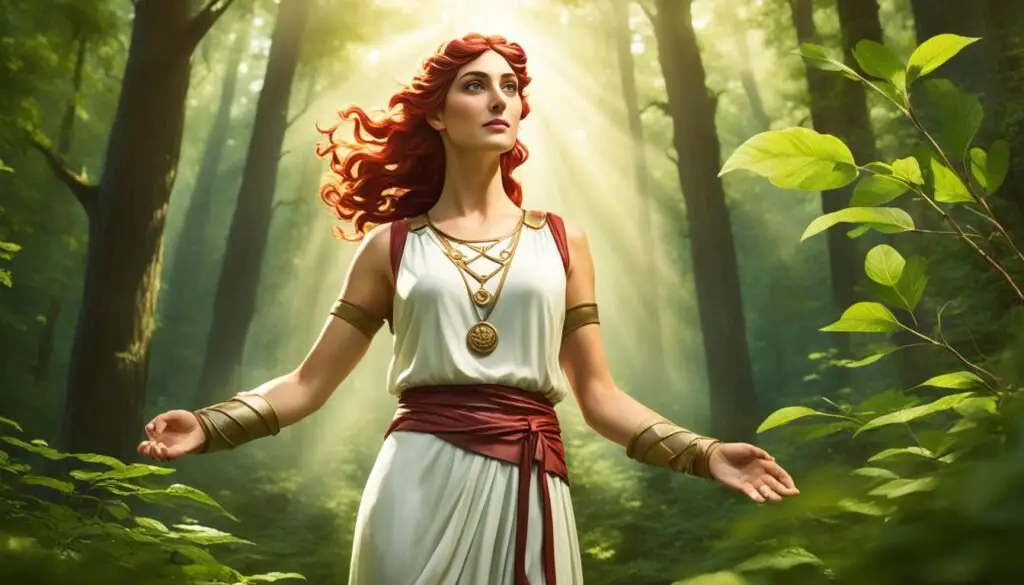Enter the world of Greek mythology and meet Pyrrha, a key but often overlooked figure in ancient stories.
While many know about heroes like Achilles and Odysseus, Pyrrha’s tale shows us strength and new beginnings after bad times.
Pyrrha’s story is tied to the Greek myths of creation and the big flood that changed everything. With Deucalion, her husband, they helped make the world full again.
This reflects similar stories found in many cultures.
Pyrrha’s story isn’t about big fights like the Trojan War. Instead, it’s about quietly staying strong and starting over.
Even with the more thrilling myths around, Pyrrha’s story shines a light on Greek beliefs about facing challenges.
Key Takeaways
- Pyrrha is a key figure in Greek creation myths
- Her story parallels flood narratives from other cultures
- Pyrrha and Deucalion repopulated the earth after a great flood
- Her tale emphasizes themes of survival and renewal
- Pyrrha’s myth offers insights into Greek views on resilience
- Her story is less known but equally significant in Greek mythology
Who Was Pyrrha: An Introduction to Greek Mythology’s Unsung Heroine
Pyrrha is not as famous as some in Greek mythology, but her tale is crucial. She was born to Epimetheus and Pandora, part of a powerful family.
She married Deucalion, a connection that joins Titan and Olympian ancestries.
In ancient Greek, Pyrrha means “red” or “fire-colored.” This name suggests her strong spirit and critical role in restarting life after a flood.
Pyrrha’s story is about surviving and starting anew, unlike the usual epic fights or adventures.
Pyrrha isn’t as well-known as Achilles or Hercules, but her story is key in Greek myths.
It talks about creation, destruction, and rebirth, which are central to many ancient stories.
We will see how her actions shape the world of Greek mythology as we explore her tale.
- Daughter of Epimetheus and Pandora
- Granddaughter of the Titan Iapetus
- Wife of Deucalion, son of Prometheus
- The name means “red” or “fire-colored” in Greek
- The central figure in Greek creation myths
The Great Flood: Pyrrha’s Role in Greek Creation Myths
In Greek myths, a great flood changed the world. The story is similar to Noah’s Ark. It follows Pyrrha and Deucalion who were the only ones saved.
Their tale is key in Greek mythology, even if not as famous as the Trojan War.
Deucalion and Pyrrha: The Greek Noah’s Ark
Zeus was angry with humans, so he sent a flood. Deucalion, with a warning from his father, built a chest to survive.
The flood lasted nine days. Only Pyrrha and Deucalion survived, landing on Mount Parnassus.
Themis’ Prophecy and the Rebirth of Humankind
The couple asked Themis’ oracle for help. They were told to throw their mother’s bones behind them.
Taking it to mean stones from the earth, they did this. That act led to people repopulating the world.
The Symbolic Meaning of Throwing Stones
Throwing stones had a big symbolic meaning in this myth. Deucalion’s stones became men. Pyrrha became a woman.
This story is about new beginnings, a common theme in Greek myths. It shows how humans can start over with the help of gods.
Pyrrha’s Family Tree: Connections to Gods and Titans
Pyrrha is a key figure in Greek myths. She is connected to both Titans and Olympian gods. Her grandfather, Iapetus, was a powerful Titan.
Her grandmother was an Oceanid, connecting her to sea gods.
Pyrrha’s marriage to Deucalion linked her to legends even more. Deucalion was the son of Prometheus, the Titan who gave fire to people.
This marriage made her relationship with the gods stronger.
Pyrrha and Deucalion had two children who made a mark:
- Hellen, who was the ancestor of the Hellenic peoples
- Protogeneia, mother of Aethlius, the first king of Elis
Neptune from RWBY was also in Pyrrha’s family. She and Neptune were distant relatives, connected through Pyrrha’s grandfather, Oceanus Nikos.
The details of Pyrrha’s family tree show how gods, Titans, and humans were linked in ancient Greece.
These connections placed her in important myths of creation and human rebirth after a big flood.
The Symbolism of Pyrrha in Ancient Greek Culture

Pyrrha was a key figure in Greek stories, symbolizing new beginnings and life after death.
Her myth highlights how life always renews itself. It’s similar to the changing seasons or the dawn after a night.
Pyrrha is a Symbol of Renewal and Rebirth
In ancient Greece, Pyrrha stood for hope restarting after disaster. After a flood, she and Deucalion made new people by throwing stones.
This myth shows the strength of life to keep going, no matter what.
The Importance of Pyrrha in Greek Religious Practices
Pyrrha was important in Greek beliefs about nature and growth. Her story, along with Deucalion’s, was part of ceremonies and stories about the earth coming back to life after winter.
- Religious ceremonies
- Harvest festivals
- Creation myths
Pyrrha’s Influence on Greek Art and Literature
Greek art and writing often featured Pyrrha. Her famous story is in Ovid’s Metamorphoses, a book from about 8 AD.
Her image can be seen on ancient Greek vases and statues, showing her lasting impact.
Pyrrha and Deucalion: A Tale of Devotion and Survival
Greek mythology is full of stories of love and survival. Pyrrha and Deucalion’s tale shines as a model of devotion in ancient Greece.
They faced a flood that destroyed the world, yet their love stayed strong.
Pyrrha and Deucalion are seen as real heroes in Greek myths. Their strong bond with each other and with the gods saved them from the flood.
Zeus spared them because of their virtues.
Their story is like flood myths in other cultures. You can see this in the Mesopotamian Flood Myth, with Utnapishtim and Ziusudra.
Pyrrha and Deucalion also built a boat to survive the flood.
Once the flood was over, they faced a big task: they had to make new people. They did this by throwing rocks, which turned into humans.
This action highlights the importance of working together in Greek stories.
The story of Pyrrha and Deucalion is about bouncing back and helping each other. It proves that love can win over tough times, even after a disaster.
Their story still inspires us, showing how powerful love is in Greek myths.
Comparing Pyrrha to Other Mythological Figures
Pyrrha is a unique character in Greek myth. She brings a message of new beginnings and hope. This is different from figures like Achilles’ wife, tied to the Trojan War.
Pyrrha vs. Pandora: Contrasting Female Figures
In Greek myths, Pyrrha and Pandora are very different. Pandora, Pyrrha’s mother, caused trouble by opening a box she shouldn’t have.
In contrast, Pyrrha helped people survive a flood. This difference underlines Pyrrha’s special role as a symbol of starting anew.
Flood Myths Around the World
Pyrrha’s tale echoes flood stories from many cultures. Flood myths are found in the Bible’s Noah’s Ark and the Epic of Gilgamesh from Mesopotamia.
They all talk about a couple who must restart humanity, just like Pyrrha and Deucalion did in Greek myth.
Pyrrha’s Place in the Greek Pantheon
Pyrrha isn’t a goddess, but she’s still special in Greek myth. She comes from Titans and is the first Greek woman, to connect gods and humans.
Her story is about surviving hard times and making things new. Pyrrha stands for hope and strength in Greek myths.
The Legacy of Pyrrha in Modern Culture
Pyrrha, a character from Greek mythology, continues to influence art and stories today. While not as famous as some, people still find her story captivating.
She is a favorite among those who love ancient myths and epic tales.
In the world of books, Pyrrha’s story has inspired many new versions. The Philological Quarterly even shared a detailed study about her.
This essay talks about how Pyrrha’s character still sparks interest in scholarly circles.
Movies and shows have also made Pyrrha a part of their worlds. A show called RWBY has a character named Pyrrha Nikos.
This Pyrrha is a strong fighter and a kind friend. She reflects the qualities of the original Pyrrha well.
- Pyrrha Nikos graduated top of her class at Sanctum Academy
- She won the Mistral Regional Tournament four consecutive years
- Pyrrha became a mascot for a popular cereal brand
Pyrrha’s story also connects with issues like saving our planet and rebuilding communities.
Her tale includes surviving a flood and helping the earth recover. It stands for being strong and hopeful, which are key messages today.
Pyrrha’s Connection to the Natural World
In Greek mythology, heroes often share a deep bond with nature. Pyrrha is a significant character who showcases this union.
Her story underlines the close connection between ancient heroes and the natural world.
The Symbolism of Stones and Earth in Pyrrha’s Story
Stones are key in Pyrrha’s story. She and Deucalion, her husband, used them to repopulate the earth after a flood.
This symbolizes the earth’s ability to renew itself.
Pyrrha’s Role in Greek Agricultural Traditions
Ancient Greeks linked Pyrrha to fertility and the harvest. They believed calling on her name would ensure good crops.
This link shows how crucial agriculture was in their society.
Environmental Themes in the Myth of Pyrrha
Pyrrha’s myth highlights environmental issues. The story of the flood resonates with today’s climate change worries.
Her part in re-greening the planet reflects the value of sustainable practices.
Pyrrha’s legend, rich in nature, remains influential. It teaches us about our ties to the planet and the cycles of life.
This ancient Greek myth still offers lessons for our modern understanding of the environment.
Uncovering the Historical Basis for Pyrrha’s Myth
Greek mythology mixes the true with the make-believe. Pyrrha’s story is a good example. Many experts link her tale, of a big flood, to real ancient floods in Greece.
This shows how myths often hint at real issues that people face.
The Battle of Ascension, shown in a Haven mural, illustrates how myths can remember true history. It was a big fight in 706 BGW against the Grimm.
This event, like Pyrrha’s story, seems to reflect actual historical battles. These myths were meant to motivate and teach those who came after, just as the stories of the Trojan War did.
It’s fascinating that Pyrrha Nikos in the RWBY show is inspired by Ancient Greek myths. Her story is one of tragedy, mixing fate with personal choices.
This modern take highlights how ancient myths still influence how we tell stories today. It keeps the essence of characters like Pyrrha alive in our culture.
Frequently Asked Questions
What does Pyrrha symbolize?
Pyrrha symbolizes renewal and the rebirth of humanity in Greek mythology. She and her husband Deucalion repopulated the earth after the great flood, representing hope and the resilience of humankind.
Was Pyrrha a demigod?
Pyrrha was not a demigod in Greek mythology. She was a mortal woman, the daughter of Epimetheus and Pandora.
Did Pyrrha marry her cousin?
Yes, Pyrrha married her cousin Deucalion. Deucalion was the son of Prometheus, who was the brother of Pyrrha’s father Epimetheus.
Who is the husband of Pyrrha?
The husband of Pyrrha is Deucalion. Deucalion was the son of Prometheus and, like Pyrrha, was one of the few survivors of the great flood in Greek mythology.
Who killed Pyrrha?
There is no myth that specifically recounts Pyrrha being killed. In Greek mythology, Pyrrha lived to old age with her husband Deucalion after repopulating the earth.
Why was Achilles called Pyrrha?
Achilles was called Pyrrha when he was disguised as a girl on the island of Skyros. The name Pyrrha, meaning “red-haired,” was chosen because of Achilles’ red-blonde hair.




